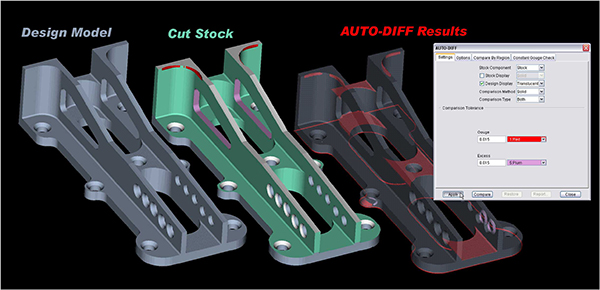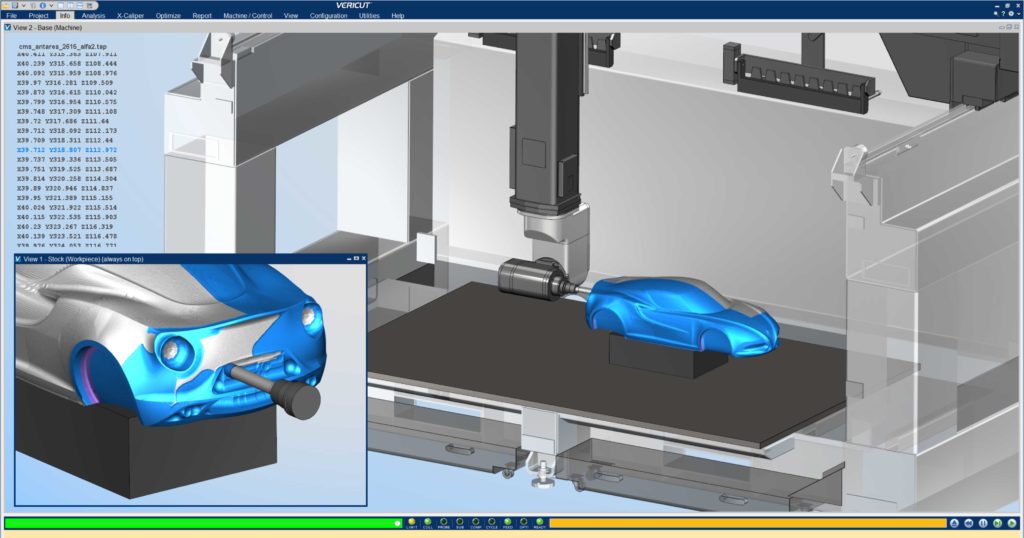Creating efficiencies in your automotive processes from the start
The automotive industry is in the middle of a shift towards conventional vehicles with internal combustion engines. The move towards hybrid vehicles has rapidly picked up pace over the last few years and plug-in hybrids are becoming even more popular. The future is battery electric or fuel-cell electric vehicles, referred to as NEV – New Electric Vehicles. These changes in the automotive industry require new types of components, including electric motor housings, new types of gear housings, new examples of covers and all accessories related to E-mobility. There will be increased demand for re-tooling, new tooling and processes to produce these components. High volume will remain key to the industry, and cycle time – cost, seconds and pennies – will always be a concern, so it’s important to get things right from the very beginning.
Getting it right from the start
Every step in the process – engineering, design, CAM programming and machining – should be inspected, verified and optimised. Simulation software ensures programs are error free and all operations work together as intended, and optimisation ensures the whole process is operating as efficiently as possible to save time and money. Developed by CGTech, VERICUT is an independent CNC machine tool simulation, verification and optimisation software that enables users to link all the machining operations end-to-end to evaluate and improve the entire manufacturing process.
The priority in automotive production is increasing output, while minimising costs. Manufacturers typically have very high volume, so cost per unit and cost control are extremely important. Focus is on planning production efficiently from the start.
Mistakes can be costly. Consider the production environment – the machines, their automation, the required floor space, raw materials and invested capital – and the initial information required for accurate process planning – machining operations, required tools, the cycle time, production rate and requirements.
This is where VERICUT comes in to play. It has the ability to analyse the process before any machining takes place or before cutting material – in essence, it reduces prove-out time.
Prove out
The major challenges facing automotive manufacturers when proving-out parts on a machine for the first time can range from scrapped parts, broken tools and holders, to fixture or spindle repair, or replacement. Ultimately, this can result in machine down-time, schedule disruption, insufficient capacity and lost contracts. VERICUT simulation and verification can resolve these issues and eliminate factors that are going to cost downtime, money and safety on the shopfloor.
VERICUT becomes part of the process once the NC code has been created, but prior to any machining on the shopfloor. The engineer or programmer, who is offline from the machine, can perform a virtual prove-out and identify potential issues in the NC program. VERICUT verifies post-processed G-Code instead of the CL data. This is the exact same G-Code that runs within the NC system of the machine, enabling the software to carry out a comprehensive machine simulation based on the same data that will operate the machine. Any errors will be highlighted in the VERICUT logger, which when clicked on will link directly back to the line of NC code where the error occurred. Simultaneously, rather than sitting idle, the machine can be producing parts, thus removing the wait time from the machining process. Valuable machine time is therefore not wasted and machinists can be confident that the program will deliver accurate parts without collisions or disruption.
Simple set up
The machine features, components, fixtures and stock in VERICUT are identical to the physical process. Setting up VERICUT is simple. With direct interfaces to all leading CAM systems, configured data can be quickly imported into VERICUT, which is another time saver. Likewise with tooling, smart tools can be imported from the cloud and other online databases – already configured for VERICUT’s use. VERICUT will identify tool related errors, for example, where it is engaged in material but the spindle is not on, and instances when the tool is going too fast or not being used efficiently.
Using measurement and inspection capabilities within VERICUT, the user can also compare the machined model to what was intended. The cut stock can be measured at any time with X-Caliper including hole depths, volume removal, model thickness, air distance, diameter/radius, centre of gravity and many more. The simulated model can be compared with the original model using AUTO-DIFF, identifying any gouges or excess material. This reduces the time it takes to cut the first production-worthy part.
Make parts more efficiently
Simulation and verification address the obvious elements of machining, and once complete the process is error free, safe and will deliver the parts as intended. However, there are also hidden opportunities to make components more quickly – issues include inefficient programming and suboptimal feed rates caused by the CAM system’s inability to adjust cutting feed rates for varying cutting conditions. VERICUT Force addresses these. The goal for efficient CNC machining is to achieve a constant chip thickness that meets manufacturing standards. Maintaining a tool’s ideal chip thickness through an operation ensures that the tool is being used to its full potential, which in turn reduces machining cycles, increases tool life, and makes programs safer.
VERICUT Force is a software module within VERICUT that uses a physics-based optimisation method to determine the maximum reliable feed rate for any given cutting condition based on four factors: force on the cutter, spindle power, maximum chip thickness, and maximum allowable feed rate. It calculates ideal feed rates by analysing tool geometry and parameters, material properties of the stock and cutting tool, detailed cutting tool edge geometry, and VERICUT cut-by-cut contact conditions.
Shifts in market demands in the automotive industry have already seen, and will continue to see, the need for new components and the processes to produce them. Simulating, verifying and optimising machining processes from the start using verification software, such as VERICUT, will ensure that these processes deliver accurate parts, as efficiently and quickly as possible, without collisions and downtime. Ultimately, automotive manufacturers will achieve high-volume production goals, while reducing costs and maintaining quality.







